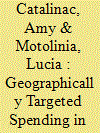| Srl | Item |
| 1 |
ID:
177178


|
|
|
|
|
| Summary/Abstract |
Being able to hold politicians accountable is the hallmark of democracy, and central to this is the notion that politicians can run for reelection. Most research on reelection incentives compare politicians who are term-limited with those who are not. These studies concentrate mostly on relatively senior politicians in candidate-centered electoral systems. This article leverages a quasi-natural experiment posed by the staggered implementation of the 2014 Mexican Electoral Reform, which lifted an eighty-year-old ban on reelection. The author conducts a difference-in-differences analysis of the hypothesis that reelection encourages legislators to focus more on policies with the highest “electoral yield”—namely, particularistic legislation. Applying a correlated topic model to a new collection of transcripts from 6,890 legislative sessions in 20 Mexican states between 2012 and 2018, this article presents compelling evidence that it does, that the effect is synchronized with the electoral cycle, and that it is larger when the legislators’ political horizons are longer.
|
|
|
|
|
|
|
|
|
|
|
|
|
|
|
|
| 2 |
ID:
181198


|
|
|
|
|
| Summary/Abstract |
Can governments elected under mixed-member majoritarian (MMM) electoral systems use geographically targeted spending to increase their chances of staying in office, and if so, how? Although twenty-eight countries use MMM electoral systems, scant research has addressed this question. The authors explain how MMM’s combination of electoral systems in two unlinked tiers creates a distinct strategic environment in which a large party and a small party can trade votes in one tier for votes in the other tier in a way that increases the number of seats won by both. They then explain how governing parties dependent on vote trading can use geographically targeted spending to cement it. These propositions are tested using original data from Japan (2003–2013) and Mexico (2012–2016). In both cases, municipalities in which the supporters of governing parties split their ballots as instructed were found to have received more money after elections. The findings have broad implications for research on MMM electoral systems, distributive politics, and the politics of Japan and Mexico.
|
|
|
|
|
|
|
|
|
|
|
|
|
|
|
|